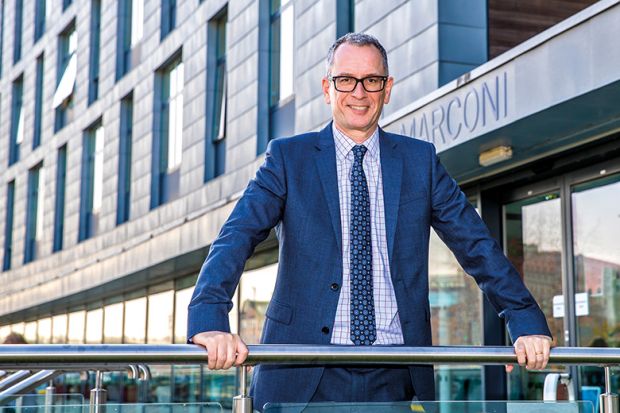The largest of Anglia Ruskin University’s four campuses is in Cambridge, a city with worldwide higher education fame, yet the institution’s name references a term for eastern England and a Victorian art critic. Two of its researchers recently won the university’s very first grants from the highly prestigious European Research Council, only for one of them to leave the UK sharpish because of Brexit.
There are a few discordant notes to harmonise for ARU’s new vice-chancellor, Roderick Watkins – surely the only university leader to have composed an opera.
ARU is “very strongly focused on our regional mission” in the east, and across its four campuses – in Cambridge, Chelmsford, Peterborough and London – the “commonality is about providing genuinely inclusive and innovative routes into higher education”, Professor Watkins, appointed in February, told Times Higher Education.
Cambridge and Chelmsford, the locations for the two largest campuses, “sit in regions of really remarkable differentiation” in wealth, where economic growth in the cities has not spread to poorer surrounding areas with low higher education participation rates, he said. “Anglia Ruskin should be absolutely an engine for tackling that problem,” he added.
In Chelmsford, the focus is on expanding the engineering offer to meet the needs of local employers, while in Cambridge “we’re putting a lot of focus on creative industries and areas like computer games”, Professor Watkins said.
At ARU’s Cambridge campus, there is a new 220-seat, high-tech “super lab” used by students in fields such as forensic science (a key growth area) and also schoolchildren gaining a taste of university-level science; a 270-seat theatre, home to student and professional productions; and the public Ruskin Gallery, where student art is on display alongside local children’s work and a Yoko Ono exhibition will feature in the autumn.
The Ruskin Gallery is part of the university’s Cambridge School of Art, where John Ruskin gave the inaugural address in 1858. When the university changed its name in 2005, it took Ruskin’s name.
While Professor Watkins said he was “delighted Ruskin is in our name” – because the great Victorian emphasised the “power of education” – he conceded that there were “challenges around a name that doesn’t have a location in it”. Overseas students have been known to talk of “Angela Ruskin”.
Hence, ARU was due to launch a new “brand” on 17 June. While keeping the university’s existing name, this new brand will also give prominence to “ARU Cambridge” – thus making better use of the city’s worldwide fame – and to similar independent identities for the other campuses.
Professor Watkins spoke to THE before news broke that an ARU graduate was paid £60,000 in settlement of claims that her degree “exaggerated the prospects of a career”, with blanket media coverage posing separate brand problems.
In terms of future challenges, “Brexit poses a serious risk to Anglia Ruskin, as it does to all universities”, particularly because European Union research funding is key for ARU, said Professor Watkins.
On that front, Susan Flavin was awarded an ERC grant for a project on food, culture and identity in Ireland as an ARU researcher last year. She has since moved to Trinity College Dublin because of Brexit uncertainty, which was “very frustrating for us and…very disappointing for her”, said Professor Watkins.
It was “fundamentally important to us” that the UK should associate to EU research post-Brexit, and a domestic replacement scheme might bring “increased hyper-concentration” that sidelines universities such as ARU, he said.
Professor Watkins was a professor of composition and contemporary music at Canterbury Christ Church University before moving to ARU in 2014, where he was initially pro vice-chancellor and dean of arts, law and social sciences.
In his life as an academic, Professor Watkins wrote the score for an opera, The Juniper Tree, which premiered at the Munich Biennale opera festival in 1997. The opera was “very dark and very violent, very entertaining”, said Professor Watkins, who described his music as involving “a lot of work with computer-generated sound”.
Is running a university anything like composing? “The obvious connections are about strategic planning…planning something large and complex, but making sure you can hold it all in your head at once,” Professor Watkins said. “The intellectual task behind both of them – there’s something in common, which I really enjoy.”
One big concern for him is preserving the combination of research and teaching at ARU. The university has “absolutely world-leading research in vision and music therapy and a number of other areas”, Professor Watkins said. He added that it was “fundamentally important that we have an HE sector in the UK that is as diverse as possible”, where a university such as ARU “committed to inclusive education…can properly foster and support really excellent research”.
POSTSCRIPT:
Print headline: On brand and on Brexit, v-c aims to find harmony
Register to continue
Why register?
- Registration is free and only takes a moment
- Once registered, you can read 3 articles a month
- Sign up for our newsletter
Subscribe
Or subscribe for unlimited access to:
- Unlimited access to news, views, insights & reviews
- Digital editions
- Digital access to THE’s university and college rankings analysis
Already registered or a current subscriber? Login








